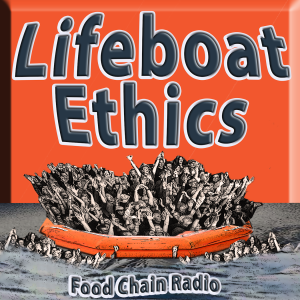

In the following paragraphs I shall argue that all three of Hardin’s assumptions are incorrect. As the National Observer put it, “let ’em starve” is an ethical consequence of Hardin’s lifeboat ethics, and the “em” are all the others who are not the trustees of civilization. If we do not, they will only produce more babies, thereby exacerbating an already critical situation.
#Lifeboat ethics plus#
Hardin’s analysis (the lifeboat model plus the trustees of civilization theory), coupled with his three assumptions (population causes scarcity, class structure is inevitable, and class structure is desirable), lead to the conclusion that it is our moral responsibility to future generations to withhold resources from those who presently do not have enough to survive. Third, privileged classes are necessary or at least desirable to make a better life (or at least an acceptable life) for future generations. Second, the distribution of resources into have and have-not lifeboats is inevitable. This two step analysis is backed by three basic assumptions: First, the world’s population is locked into a scarce resource situation mainly because of its excessive size. Fortunate minorities must act as the trustees of a civilization that is threatened by uninformed good intentions. It is unlikely that civilization and dignity can survive everywhere but better in a few places than in none. Second, his theory of the guardians of civilization, What should the passengers on a rich lifeboat do? This is the central problem of ‘the ethics of a lifeboat’. Continuously, so to speak, the poor fall out of their lifeboats and swim for a while in the water outside, hoping to be admitted to the rich lifeboat, or in some other way to benefit from the ‘goodies’ on board. The poor of the world are in other, much more crowded lifeboats.
#Lifeboat ethics full#
Metaphorically, each rich nation amounts to a lifeboat full of comparatively rich people. First, his lifeboat ethics, as he states in Bioscience , What exactly does Hardin say? His analysis of the current food and population crisis proceeds along two interrelated lines.

The ecological analysis is scientifically wrong, but ideologically consistent. It is a pernicious political doctrine based on a so called ecological analysis. What has now come to be called Hardinism is more sinister than most of its detractors admit.
#Lifeboat ethics tv#
He is currently active on the lecture circuit and has appeared on several TV talk shows, primarily for the purpose of selling his latest reactionary dogma. His most well known work is “The Tragedy of the Commons” 1, a thinly disguised attack on community owned property and collective responsibility. Originally a bacteriologist, Hardin began writing on ecological and environmental issues about 10 years ago. He commandeers a bandwagon which uses a pseudoscientific ecological analysis to justify the past and current policy of a class biased distribution of resources. He has seized the time and found a friendly reception from an audience fully primed with tales of welfare chislers, lazy poor folk, and belligerently unthankful recipients of foreign aid. Once a little known man preaching strange science, his name now appears in Time magazine and on placards at demonstrations in India.

The metaphor ignores salient features of the actual world in order to lend.Garrett Hardin has finally made it. In two substantially identical essays published in 1974, Hardin used a lifeboat metaphor as an alternative to the then-popular metaphor of “spaceship earth.” The spaceship earth metaphor, he argued, makes sense only if all on the spaceship are under the control of one captain, for the notion of a spaceship that runs by committee, or through democratic elections, is senseless. A paradox of rationality and virtue, the tragedy of the commons is what happens when a plethora of people, all acting out of short-term rational self-interest, degrade, destroy, or deplete a common resource – resulting in a consequence that is not in anyone’s long-term self-interest. Although the idea dates back at least as far as the eighteenth century, the term “lifeboat ethics” denotes a position first proposed by influential Texan ecologist Garrett Hardin (1915–2003), whose ethical perspective traces back to the tragedy of the commons.


 0 kommentar(er)
0 kommentar(er)
